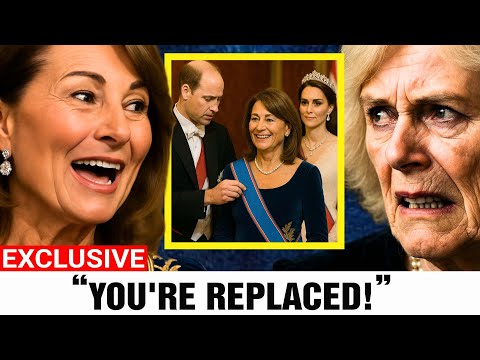Minutes Ago! William Crowns Catherine’s Mother Duchess Of Berkshire, Camilla Brutally Cast Aside.

Prince William, the Prince of Wales and heir to the throne, has unleashed a bold and provocative act, one that has inflamed a long-simmering feud and redrawn the lines of power. By bestowing upon his mother-in-law, Carol Middleton, the unprecedented title of Duchess of Barkshire, William has not only elevated a commoner to the heights of aristocracy but also delivered a crushing blow to Queen Camilla’s iron grip on the royal court.
This dramatic maneuver, rooted in a decades-long clash of class and influence, has left Camilla enraged. Her once unassailable authority shattered and the monarchy teetering on the edge of chaos. The seeds of this dramatic move were sewn years ago as William grew increasingly reliant on the Middletons’ unshakable support. Unlike the often fractured dynamics of the royal family, the Middletons offered William a sense of stability and warmth, particularly after the tragic loss of his mother, Princess Diana. Carol, with her sharp wit and entrepreneurial spirit, became a surrogate mother figure, guiding William through personal and public challenges.
Her role became even more pronounced during Catherine’s recovery from major abdominal surgery in early 2024, when Carol was a constant presence assisting with the school run for Prince George, Princess Charlotte, and Prince Louis at Lambrook School—just a short drive from the Middletons’ Bucklebury home.
William’s gratitude for this unwavering support has now manifested in a title that places Carol on a pedestal once reserved for the highest echelons of the aristocracy. The title of Duchess of Barkshire is no mere honorific. It is a calculated strike, a glittering symbol of William’s loyalty to the Middleton family and his determination to dismantle Camilla’s dominance.
Barkshire, the county where Carol and Michael Middleton raised their children—Catherine, James, and Pippa—in the serene village of Bucklebury, carries profound significance. The title evokes the historic weight of duchies like York or Cambridge. It anchors the Middletons to the legacy of the Princess of Wales, Catherine, whose grace and public adoration have made her the monarchy’s modern face. But more critically, it positions Carol as a rival to Camilla, a matriarch whose quiet resilience and sharp business acumen now wield a power that challenges the Queen Consort’s carefully constructed empire.
The feud between Camilla and Carol is no recent spat. It is a bitter saga steeped in class prejudice and personal vendettas stretching back to the early days of William and Catherine’s courtship. Camilla, born into the landed gentry and long accustomed to the rarified air of aristocratic circles, has never concealed her disdain for the Middletons’ middle-class origins. To her, Carol, a former flight attendant who built the successful Party Pieces business, was an upstart—her ambition and proximity to the royal family a threat to the traditional order.
Palace whispers, reported by the Times in 2010, revealed Camilla’s private mockery of the Middletons’ neo-royal manners, with barbed comments about Carol’s pushy demeanor and her perceived social climbing. This disdain manifested in subtle but cutting slights—from excluding Carol from key royal events to ensuring her presence was minimized at court.
Camilla’s hostility reached its zenith in 2007 during a tumultuous period when William briefly ended his relationship with Catherine. Sources close to the couple, cited in a 2011 biography by royal author Katie Nicholl, alleged that Camilla played a pivotal role in sowing doubt about Catherine’s suitability as a future queen. Whispering in Charles’s ear, Camilla argued that Catherine lacked the pedigree and resilience for royal life, urging William to seek a bride from a more appropriate background. Her manipulations, though ultimately unsuccessful, left a lasting scar on the Middletons, with Carol privately vowing to protect her daughter’s place in the royal fold.
The wound deepened years later when Camilla, now Queen Consort, reportedly imposed a shocking edict banning William and Catherine’s children—Prince George, Princess Charlotte, and Prince Louis—from visiting their maternal grandparents’ Bucklebury home. According to a 2022 report in the Express, Camilla justified the ban as a matter of security protocol, but insiders saw it as a power play—an attempt to sever the Wales children’s ties to their middle-class roots and assert her control over the next generation.
William’s decision to name Carol Duchess of Barkshire is the culmination of these grievances—a defiant act of retribution that has obliterated Camilla’s carefully cultivated dictatorship. The title, grander than the Earl and Countess of Bucklebury once proposed by businessman Sir John Madski in 2014, elevates Carol to a status that rivals Camilla’s own. Madski’s suggestion, reported by the Daily Mail, was a nod to the Middleton’s pivotal role in supporting William and Catherine. But William’s choice of a duchess—a rare honor historically reserved for royal blood—signals his intent to rewrite the rules.
As Duchess of Barkshire, Carol now commands a platform to rival Camilla’s, with the potential to take on high-profile patronages and public roles, particularly in Catherine’s initiatives like early childhood development and mental health advocacy.
For Camilla, this is a devastating blow. Her reign as Queen Consort, solidified after King Charles III’s coronation in May 2023, has been defined by her unchallenged influence over palace affairs. From orchestrating state banquets to steering royal messaging during Charles’s cancer treatment in 2024, Camilla has positioned herself as indispensable, her authority unquestioned. But William’s move has forced her into uncharted territory, compelling her to operate under a new set of rules—one where the Middletons, once dismissed as outsiders, now hold sway.
Camilla is furious, utterly humiliated—a palace source told the Telegraph in April 2025. She spent years keeping the Middletons at arm’s length, and now Carol is practically her equal. “It’s a nightmare for her,” the source said. The public has seized on the drama, with X ablaze with posts celebrating Carol’s rise and gleefully noting Camilla’s fall. Hashtags like #SunangDuchessCarol and #MiddletonvsCamilla have trended, with users lording Carol’s relatability and resilience.
Camilla tried to keep the Middletons down, but Carol’s a queen in her own right now—one post read, garnering thousands of likes. Polls by YouGov in 2024 already showed Camilla trailing Catherine and William in public approval. And this latest scandal has only widened the gap, with Carol emerging as a folk hero for those who see her as a triumph of merit over privilege.
Within the palace, the atmosphere is electric with tension. Camilla’s loyalists have clashed openly with William’s staff, with reports of heated exchanges over scheduling and protocol. At a recent state dinner, observers noted Camilla’s icy demeanor as Carol, radiant in her new role, mingled effortlessly with dignitaries. Carol doesn’t flinch under Camilla’s glare. A source told the Sun, “She’s always been a force, and now she has the title to back it up.”
Camilla, meanwhile, has retreated into a strategy of containment, doubling down on her public engagements to shore up her image. But her efforts are overshadowed by the Middleton mania sweeping the nation. William’s gambit is both a personal tribute and a political masterstroke. The Middletons have been his rock, offering warmth and stability absent in the royal family’s often fractured dynamics. Carol’s steadfast presence manages the school run for the Wales children—cementing William’s gratitude. By elevating her, he not only honors that loyalty but also asserts his vision for a monarchy unbound by outdated hierarchies.
Yet, the move is not without peril. Traditionalists decry the Barkshire Duchy as a reckless break from protocol, while Camilla’s allies whisper of retaliation, hinting at potential leaks to discredit the Middletons. As the monarchy navigates this turbulent chapter, Carol Middleton stands at its epicenter—a duchess whose rise has upended centuries of tradition.
Camilla, her power fractured, faces a future where her influence is no longer absolute. For William, the stakes are clear: by empowering his mother-in-law, he has reshaped the royal landscape—but at the cost of igniting a feud that could consume the House of Windsor. In this high-stakes clash of crowns and class, one truth resonates: the Duchess of Barkshire has changed the game, and the battle for supremacy is only beginning.






